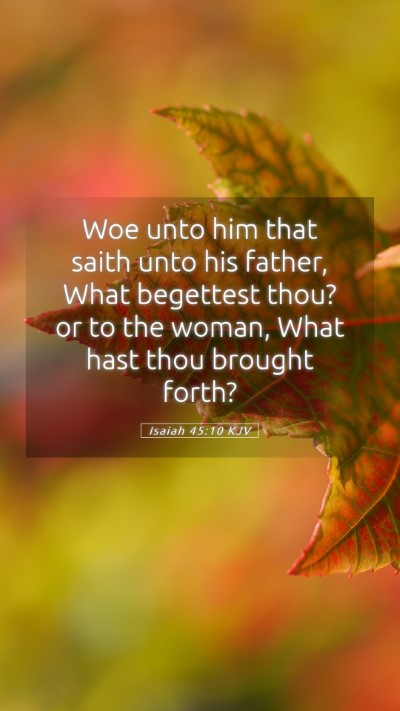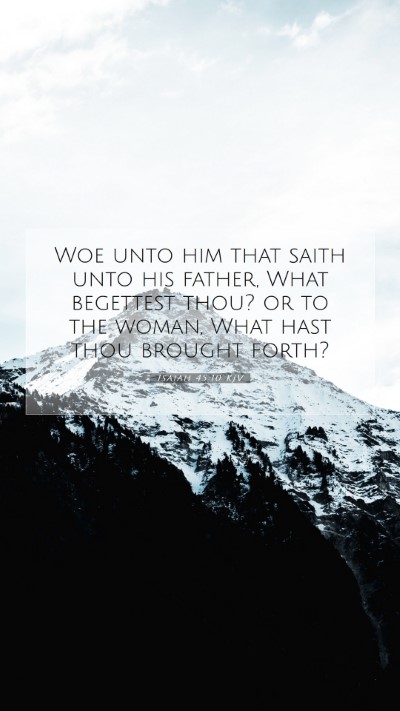Understanding Isaiah 45:10
Bible Verse: Isaiah 45:10 - "Woe unto him that saith unto his father, What begettest thou? or to the woman, What hast thou brought forth?"
Overview
The verse Isaiah 45:10 reflects a profound insight into human ignorance and the consequences of questioning divine authority in the matter of life and creation. This exclamation of "woe" signifies a strong warning against challenging God's creative work and the roles assigned to the parents. Such attitudes signify a broader rebellion against God's ordained design.
Verse Meaning and Interpretation
This verse can be broken down into several interpretive insights drawn from renowned public domain commentaries:
-
Matthew Henry's Commentary:
Henry emphasizes the gravity of questioning God's creation. By questioning what a father begets or what a mother brings forth, it shows a lack of appreciation for the sacredness of parenthood and the divine role in procreation. The verse condemns a spirit of irreverence that fails to recognize God's hand in the natural order of life.
-
Albert Barnes' Notes:
Barnes reflects on the implications of disputing God’s will or authority. He highlights that these questions are not merely inquiries but serve as a challenge to God’s sovereignty. The folly in disregarding the power of God in creation leads to severe consequences, marking those who engage in such questioning as deserving of “woe”, or calamity.
-
Adam Clarke's Commentary:
Clarke explains that the verse portrays a striking irony: the created being questioning the creator. He mentions that the inquiries posed in this text are indicative of a lack of respect and understanding of the roles within divine order, which leads to spiritual and moral degradation. Clarke connects this questioning to larger themes of accountability before God.
Key Themes and Concepts
The themes in Isaiah 45:10 resonate through various biblical teachings:
- Divine Authority: The verse emphasizes that God holds ultimate authority over creation, and humanity is called to honor that. This reflects an essential aspect of Bible verse understanding where acknowledging God’s sovereignty is foundational.
- Reverence for Life: A fundamental part of bible study insights is understanding the sanctity of life, which stems from recognizing that life is a gift from God. This verse cautions against irreverence.
- Consequences of Questioning God: The "woe" declaration is a stark reminder seen throughout scripture that rebellion against God's will leads to dire outcomes (Proverbs 1:7).
Cross References
This verse resonates with several other scriptural references:
- Job 38:2-4 – God questions Job about the foundations of the earth.
- Psalm 139:13-16 – Reflects on God's involvement in the creation of life.
- Romans 9:20 – Discusses humanity’s position as created beings before the creator.
Application for Today
Understanding Isaiah 45:10 encourages us to reflect on our relationship with God and our response to His authority. This can be applied in various aspects of life:
- Bible Study Groups: Engaging in discussions around this verse can enhance collective insight into the nature of God, parenthood, and the divine order of creation.
- Online Bible Study: Utilizing platforms to explore the significance of Isaiah 45:10 helps individuals understand difficult Bible passages.
- Bible Study Guides: Incorporating insights from Isaiah 45:10 into study materials can illuminate the importance of reverence in our personal faith journey.
Conclusion
Isaiah 45:10 serves as a critical reminder of the importance of recognizing God’s sovereignty and the sanctity of life and creation. This verse not only carries deep theological significance but also urges us to adopt a posture of respect and reverence in our lives.
Final Thoughts
As we delve into Bible verse interpretations like Isaiah 45:10, we cultivate a deeper understanding Scripture that positions us wisely in our daily lives, reminding us of God's everlasting role in creation and the implications of our responses to His authority.


